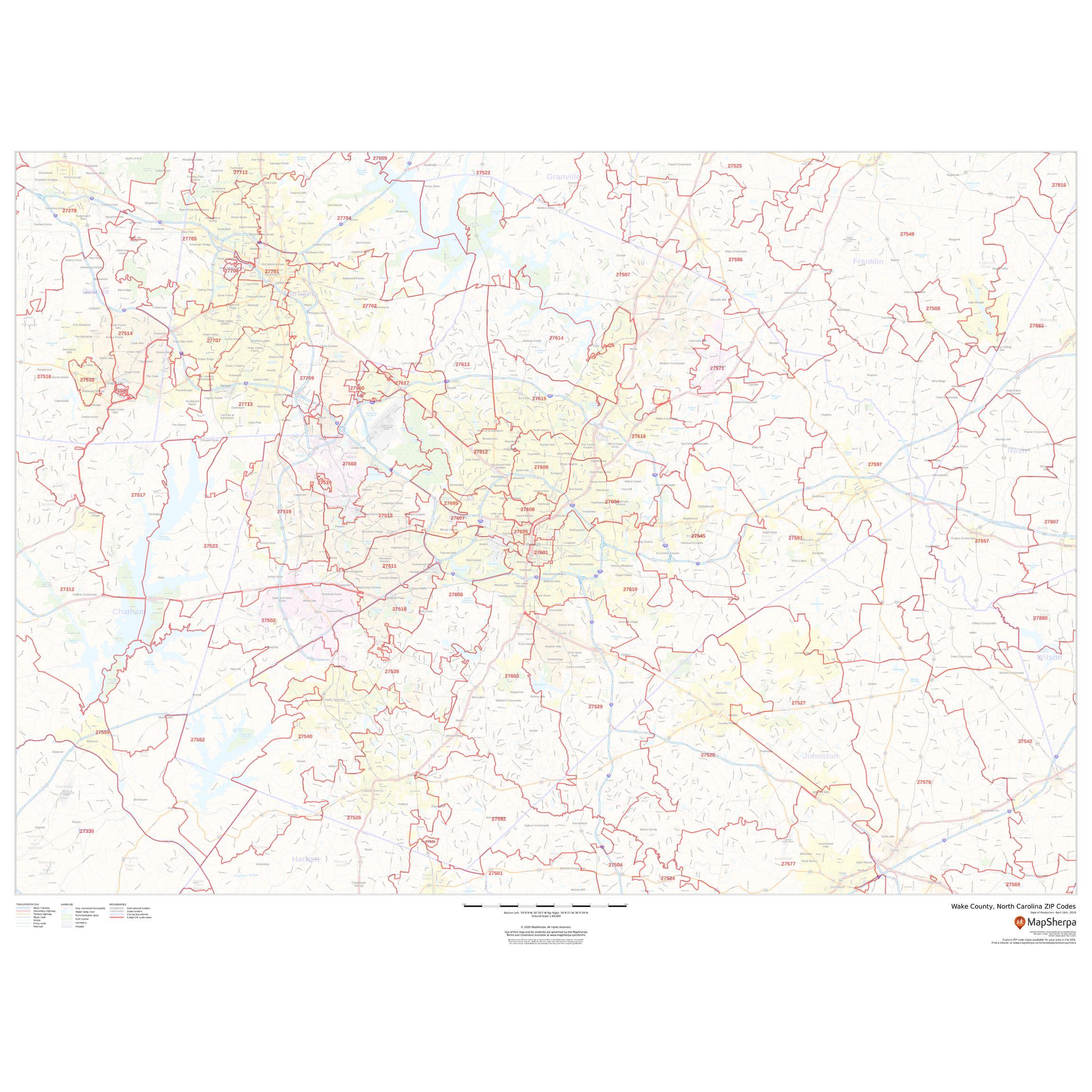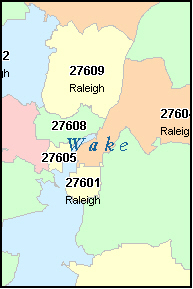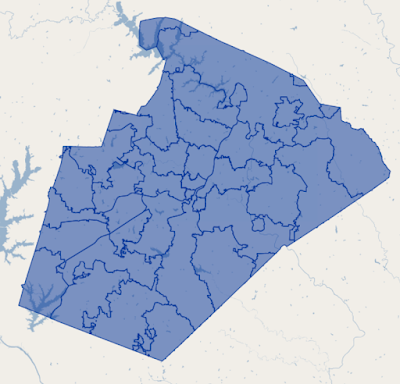Navigating Wake County: A Comprehensive Guide to Zip Codes
Related Articles: Navigating Wake County: A Comprehensive Guide to Zip Codes
Introduction
With great pleasure, we will explore the intriguing topic related to Navigating Wake County: A Comprehensive Guide to Zip Codes. Let’s weave interesting information and offer fresh perspectives to the readers.
Table of Content
Navigating Wake County: A Comprehensive Guide to Zip Codes

Wake County, North Carolina, a bustling hub of commerce, culture, and education, is home to a diverse population and a dynamic landscape. Understanding the county’s zip code system is essential for navigating its intricate network of communities, businesses, and services. This article provides a comprehensive overview of Wake County’s zip codes, highlighting their significance and offering practical guidance for residents, businesses, and visitors alike.
A Geographic Tapestry of Numbers:
Wake County’s zip code map is a visual representation of the county’s geographic and demographic divisions. Each zip code encompasses a distinct area, often aligning with established neighborhoods, towns, and cities. These numerical identifiers serve as valuable tools for:
- Mail Delivery: The primary function of zip codes is to facilitate efficient mail delivery. By providing a standardized system for sorting and routing mail, zip codes ensure timely and accurate delivery of letters, packages, and other mail items.
- Emergency Services: Emergency responders rely on zip codes to quickly locate addresses and dispatch appropriate assistance. This is crucial for minimizing response times and ensuring the safety of residents in times of crisis.
- Demographic Analysis: Zip codes are frequently used in demographic studies and market research. By analyzing data associated with specific zip codes, researchers can gain insights into population trends, consumer behavior, and economic indicators.
- Business Operations: Businesses utilize zip codes for various purposes, including targeted marketing, customer segmentation, and logistics management. By understanding the geographical distribution of their customers and potential clients, businesses can optimize their operations and tailor their services accordingly.
- Community Engagement: Zip codes can facilitate community engagement by fostering a sense of shared identity and facilitating communication among residents within a specific area. Local organizations and initiatives often utilize zip codes to target their outreach efforts and connect with residents who share common interests.
Deciphering the Zip Code Landscape:
Wake County is divided into numerous zip codes, each representing a unique geographical area. Some of the most prominent zip codes include:
- 27601 (Raleigh): Encompassing the heart of Raleigh, this zip code is home to a mix of residential, commercial, and government buildings. It includes iconic landmarks such as the State Capitol and the North Carolina Museum of Natural Sciences.
- 27609 (Cary): This zip code covers a significant portion of Cary, a rapidly growing suburb known for its technology industry and family-friendly atmosphere. It boasts a vibrant downtown area and numerous parks and green spaces.
- 27613 (Raleigh): Located in the western part of Raleigh, this zip code is home to the North Carolina State University campus and surrounding neighborhoods. It features a mix of residential, commercial, and educational facilities.
- 27517 (Apex): This zip code covers a portion of Apex, a rapidly growing town renowned for its strong sense of community and excellent schools. It boasts a vibrant downtown area and numerous parks and recreational facilities.
- 27610 (Durham): While technically within Durham County, this zip code extends into the easternmost portion of Wake County, encompassing parts of the Research Triangle Park and surrounding areas. It is home to numerous technology and research companies.
Beyond the Numbers: Understanding the Importance of Zip Codes
The importance of Wake County’s zip code system extends beyond simply delivering mail or identifying locations. It plays a vital role in shaping the county’s social, economic, and cultural landscape.
- Community Development: Zip codes can help guide community development efforts by providing insights into specific areas’ needs and potential. By understanding the demographics and characteristics of different zip codes, local governments and community organizations can tailor their programs and initiatives to address specific challenges and opportunities.
- Economic Growth: Zip codes are instrumental in understanding the economic vitality of different areas within Wake County. By analyzing data related to employment, business activity, and consumer spending, policymakers and investors can identify areas with high growth potential and target their resources accordingly.
- Social Equity: Zip codes can shed light on potential disparities in access to resources and services across different areas. By understanding the demographics and social conditions associated with specific zip codes, policymakers and community organizations can address inequities and promote social justice.
FAQs: Navigating the World of Wake County Zip Codes
Q: How can I find the zip code for a specific address in Wake County?
A: You can easily find a zip code for a specific address using online tools such as the USPS website or Google Maps. Simply enter the address in the search bar, and the corresponding zip code will be displayed.
Q: Are there multiple zip codes within a single city or town in Wake County?
A: Yes, many cities and towns in Wake County are divided into multiple zip codes. This is often due to the size and population density of these areas.
Q: Can I use a zip code to find nearby businesses or services?
A: Yes, many online directories and search engines allow you to search for businesses and services based on zip code. This can help you find nearby restaurants, shops, healthcare providers, and other services.
Q: Is there a central database or website that provides information about Wake County zip codes?
A: While there is no single official database for Wake County zip codes, the USPS website and various online mapping tools offer comprehensive information about zip codes and their corresponding geographical boundaries.
Tips for Utilizing Wake County Zip Codes Effectively:
- Keep a list of frequently used zip codes: This can save you time and effort when addressing mail or searching for information online.
- Utilize online mapping tools: Tools like Google Maps and MapQuest can help you visualize zip code boundaries and locate specific addresses.
- Familiarize yourself with local community organizations: Many community organizations operate within specific zip code areas and can provide valuable information and support.
- Stay informed about changes to zip code boundaries: The USPS may occasionally adjust zip code boundaries to reflect population growth or other changes.
Conclusion:
Understanding Wake County’s zip code system is essential for navigating its diverse communities, businesses, and services. By providing a standardized framework for communication, logistics, and data analysis, zip codes play a vital role in shaping the county’s social, economic, and cultural landscape. By utilizing the information and resources available, residents, businesses, and visitors can effectively leverage the power of zip codes to enhance their experiences and navigate Wake County with ease.








Closure
Thus, we hope this article has provided valuable insights into Navigating Wake County: A Comprehensive Guide to Zip Codes. We appreciate your attention to our article. See you in our next article!